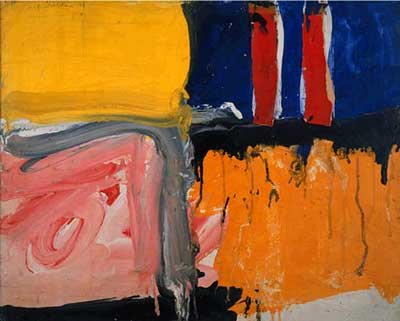 Alfred Leslie, #9, 1960 oil and collage on canvas, 24 x 30 inches (61 x 76.2 cm) Alfred Leslie 1951-1962: Expressing the Zeitgeist The exhibition will feature 11 large oil paintings and 27 small collages and mixed media works. In addition, Alfred Leslie's movies "Pull My Daisy" (1959), "The Last Clean Shirt" (1964) and "The Cedar Bar" (2002) will be screened in the gallery during the exhibition. Also on view, the Tiber Press four-volume set of poetry illustrated with original silkscreen prints by Alfred Leslie, Joan Mitchell, Michael Goldberg and Grace Hartigan (1960). Emotional, dynamic and unrehearsed, Leslie's work depends heavily on a loaded brush and energetic execution. The geometric division of the canvas into quadrants restrains his exuberant brush strokes and splattering, creating a classical dialog. This, combined with his unexpected use of color and the consistently present, double vertical bands gives Leslie's work an instantly recognizable signature. Much like de Kooning and Kline before him, Leslie conjures great scale. His miniature collages convey power usually seen in large-scale paintings. Leslie's abstractions from 1951-62 are a powerful body of work representative of the best of postwar American abstract painting. Alfred Leslie was at the epicenter of the social, political and cultural changes of the time, as a painter, a writer and a filmmaker. Painting titles like "Guevara and Nix on Nixon" suggest a political awareness not evident in the work of most of his peers. The works of today's literary giants - then relatively unknown - Jean-Paul Sartre, Allen Ginsberg, Jack Kerouac and others were featured in Leslie's 1960 single-issue review "The Hasty Papers", an edgy, anarchic commentary. Leslie's studio was the arena for a nearly continuous series of art happenings, performances, musical improvisations and parties. His movie "Pull My Daisy", co-directed with Robert Frank in 1959, is a landmark of the American underground film movement and it was inducted into the National Film Registry in 1996. Born in New York City in 1927, Leslie emerged in the late 1940s as one of the core-group Second Generation New York School of Abstract Expressionism painters, alongside Joan Mitchell and Michael Goldberg. Leslie studied in 1947 at the Art Students League and from 1947-49 with Tony Smith and William Baziotes at New York University. Throughout his career Leslie was involved in music, set design, film and literature. His early exhibitions include the 1949 New Talent group show at the Kootz Gallery and a first solo show at Tibor de Nagy in 1952. Other exhibitions followed at de Nagy and Martha Jackson, and numerous museums, including the Whitney Museum of American Art, The Museum of Modern Art and The Metropolitan Museum of Art. Alfred Leslie's work is in the collections of major museums throughout the world including the Art Institute of Chicago, Illinois; The Metropolitan Museum of Art, New York; The Museum of Modern Art, New York; The National Gallery of Art, Washington, D.C.; Kunsthalle, Basel, Switzerland; Moderna Museet, Stockholm, Sweden and Whitney Museum of American Art, New York among many others. In 1994, Leslie received the Award of Merit Medal for Painting for lifetime achievement from the American Academy of Arts and Letters. He currently lives in New York City. In 1960 Tiber Press published a set of four volumes of poetry by Kenneth Koch, John Ashbery, Frank O'Hara and James Schuyler illustrated with original silkscreen prints by Alfred Leslie, Joan Mitchell, Michael Goldberg and Grace Hartigan. Each volume consists of forty pages, jacketed in molded acetate, and all four volumes are boxed together. The edition is limited to two hundred numbered copies, signed by the poets and painters. A limited number will be for sale at the gallery. Films by David Leslie Alfred Leslie spearheaded the American underground film movement, with the help of friends and Beat generation artists, Jack Kerouac, Allen Ginsberg and Gregory Corso. In 1959, Leslie collaborated with Kerouac, Corso and Ginsberg to make one of the most influential films of their day, "Pull My Daisy". In 1964, Leslie released the controversial, avant-garde "road picture," "The Last Clean Shirt". His most recent movie, "The Cedar Bar" (2002), dissects the artist/critic relationship during a ferocious and scabrous romp through the art world. "Pull My Daisy" (29 minutes), directed by Leslie and Robert Frank, featuring Beat poets Allen Ginsberg, Gregory Corso, and with narration by Jack Kerouac, is considered to be among the first American underground films. One writer said it "severed the American avant-garde film from its European roots in symbolist poetry." In 1996, "Pull My Daisy" was inducted into the National Film Registry, acknowledging the film's cultural and aesthetic importance. Winner of the best experimental film award at the Bergamo Festival in Italy in 1964, Leslie's "The Last Clean Shirt" (44 minutes), with quirky dialogue by writer/poet Frank O'Hara, is an odd and humorous "road movie." "The Last Clean Shirt" incorporated O'Hara's unique style of writing, capturing the essence of the film-non-linear, comical and abstract. Leslie's most recent film, "The Cedar Bar" (84 minutes), is, as Leslie states in the opening, "the truth about the war between the people who make art and the people who write about it," a story told with Leslie's characteristic brio. Pieced together from assorted film clips and remembered conversations at the infamous Greenwich Village artist hangout, The Cedar Tavern, Leslie creates a colorful collage that includes artist's opinions and critical commentary, shedding satirical light on the often contentious relationships between artists and critics. Exhibition: October 16, 2004 - January 22, 2005 Gallery hours: Tue-Fri 10am - 6pm, Sat 10am - 5pm Allan Stone Gallery 113 East 90th Street USA-New York, NY 10128 Telephone +1 212 987 4997 Fax + 1 212 987 1655 E-Mail gjaksic@allanstonegallery.com www.allanstonegallery.com |